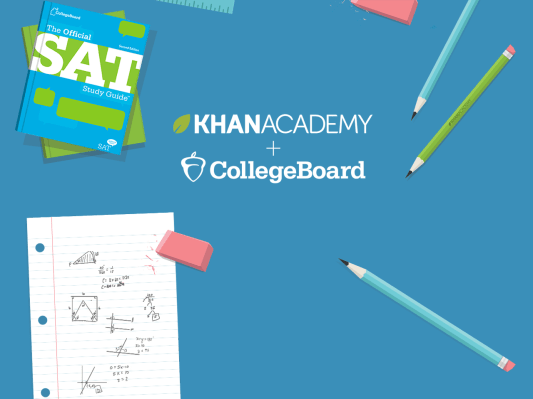Widely popular online learning platform Khan Academy closed a rare exclusive partnership with the College Board to bring free test prep software to the masses. As the College Board overhauls the panic-inducing SAT admissions exam, it’ll be giving Khan Academy access to actual test questions in the hopes of creating a sophisticated learning program aimed at test prep otherwise reserved to wealthier students.
“So big picture success is that access to college (and success in life) becomes much less dependent on income and much more dependent on merit,” Khan Academy Founder, Sal Khan, writes to me.
“We think we can make the playing field more level by making the best-in-class tool and making it free. We hope that beyond individual students, these tools become adopted by after-school and college readiness programs.”
With a huge influx of donations from Silicon Valley’s most notable philanthropists, Khan Academy quickly evolved from a YouTube lecture series to a full-blown personalized learning platform. When their new prep test software launches in spring 2015, students will have access to an artificially intelligent learning experience that diagnoses weaknesses and charts in a step-by-step path to improvement — rather than pick up a $30 one-size-fits all SAT prep book.
It’s difficult to overstate the inequality that persists between privileged and underprivileged students. Only 34 percent of students from the bottom one-fourth of the income distribution attend any of the nation’s elite colleges. Among the richest students, it’s a staggering 78 percent.
Talented self-motivated students from poor districts lack access to test prep and Advanced Placement courses. “It was really on ourselves to create those resources,” USC student, Winona Leon, lamented to The New York Times.
The spiraling nature of inequality impacts even those who manage to break the odds; those who attend elite schools are airdropping in a sea of unfamiliar faces, competing with students who already hit the ground running with internships, networking opportunities, and extra tutoring.
Inequality begins early and so does the College Board’s plan to solve America’s growing problem.
Traditional Test Prep Doesn’t Actually Help
 Test prep is no panacea: Education researchers repeatedly warn parents against spending thousands of dollars on third-party providers, such as Princeton Review, which, on average, only increase scores a measly 30 points out of 1,600. So expensive prep programs are an unlikely culprit of the achievement gap.
Test prep is no panacea: Education researchers repeatedly warn parents against spending thousands of dollars on third-party providers, such as Princeton Review, which, on average, only increase scores a measly 30 points out of 1,600. So expensive prep programs are an unlikely culprit of the achievement gap.
Ohio State professor Claudia Buchmann, who researches income disparities in college preparation, tells me that universal access to test prep wouldn’t help close the achievement gap. “I expect this would do little to improve college access or equity because it is essentially ‘too little, too late,'” she writes to me in an email. “In short, high-quality test prep for all may level the playing field a bit, but in so many other realms inequalities will continue to ensure rich kids have an advantage in getting to and getting through college over underprivileged kids.”
The College Board agreed. “The efficacy of the high-priced test preparation materials have been questioned repeatedly, and the College Board has never advocated for them,” wrote spokesperson Carly Lindauer.
But I’m told we should not despair. The College Board is optimistic that the newly retooled SAT will be less an IQ test and more a mark of academic readiness. After the relaunch in 2016, questions will look more like topics covered under the new National Common Core standards being implemented in schools around the country.
“It’s important to note that this is a redesigned exam and a new approach to SAT test prep. We’ve never before developed such comprehensive materials – especially with the expert guidance the Khan team provides,” argued John McGrath, the College Board’s vice president of communications, to me in an email.
“And as part of this partnership we will train tutors, counselors, mentors and others to help students take full advantage of these resources. The high-priced, third-party test prep that has come before is not a useful comparison.”
New Territory, Some Optimism
Traditional “test prep is basically teaching you how to take the test,” says President of Khan Academy, Shantanu Sinha. Instead of test-specific tactics (like guessing “C” rather than leaving an answer blank), Sinha argues that the newly redesigned SAT will reward students who actually learn the material.
“The reason we’re optimistic, says Sinha, is “this isn’t a new product…we’ve been doing a lot of work with classrooms.” Later this year, Sinha expects the results of a rigorous evaluation of Khan Academy’s work in pilot schools, but notes that preliminary evidence from schools who use the software is “seeing some tremendous impact.”
 Indeed, Khan Academy’s findings are nothing to scoff at. When classrooms began to experiment with self-paced learning, teachers discovered that so-called “failing students” were really just stuck on a simple concept. Once students had the ability to watch (and re-watch) the lectures at home, some raced to the head of the class.
Indeed, Khan Academy’s findings are nothing to scoff at. When classrooms began to experiment with self-paced learning, teachers discovered that so-called “failing students” were really just stuck on a simple concept. Once students had the ability to watch (and re-watch) the lectures at home, some raced to the head of the class.
When one Oakland, Calif., city charter school implemented Khan Academy lectures in addition to several other changes, learning outcomes spiked from the 20th percentile to the 99th.
As for the SAT, the state of automated coaching and tracking is still in its infancy, so we really don’t know what it can do for those who have lacked the personalized tutoring of their more affluent counterparts. Regardless, Khan Academy deserves kudos for hiring a team of data scientists to rigorously evaluate their own projects.
“We want to be able to be intellectually honest with ourselves that what we’re providing truly is a great resource,” says Khan Academy’s Elizabeth Slavitt.
I wish expensive test prep providers could say the same thing.
Two Challenges Ahead
If narrowing the national achievement gap on a new make-or-break cognitive assessment weren’t enough, there are two big problems Khan Academy still needs to figure out how to solve.
First and foremost is access to broadband. The team seems to be aware of the irony of building a multimedia-intensive resource for a population that doesn’t have good access to fast Internet. Tech companies have pledged nearly a billion dollars to President Obama’s national broadband access push, but it’s still going to take some time to roll out.
“We can only solve a certain number of problems out there,” acknowledges Sinha.
The second challenge, and perhaps most daunting, is the College Board’s long overdue emphasis on “evidence-based” writing. When I TA’d college courses, it was widely known that persuasive writing was the key to getting good grades, but few students learned this skill in high school. “Analytical reading and writing are vital for college success,” says the College Board’s McGrath.
The hard part is figuring out how to grade college essays at scale. Some Massive Open Online Course providers have experimented with algorithmic essay grading, but it’s still early days. The Khan Academy team seems to recognize that they’ve signed up for unexplored territory. Optimistically, Slavitt says, “We’ve committed a ton of resources internally.”
So one of the nation’s premier online education providers is taking some of Silicon Valley’s best minds to tackle education inequality. It’s a noble, but uncertain, mission.
Concludes Sinha, “We know we have our work cut out for us.”
Photo: Shutterstock
